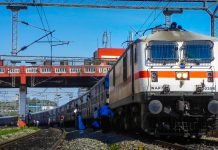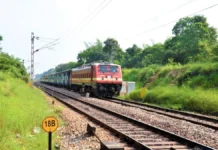NEW DELHI (Metro Rail News): Indian Railways, the world’s fourth-largest network is seeking investments from private firms to operate passenger trains for the first time. The Ministry of Railways today invited request for qualifications (RFQ) from the private companies submit their interest to run passenger trains over 109 pairs of routes by introducing 151 modern trains on Public-Private Partnership. The project will entail an investment of about Rs 30,000 crore.
The 109 pairs have been formed into 12 Clusters across the Indian Railway network. Every Train will have a minimum of 16 coaches. The 12 clusters are Mumbai-1, Mumbai-2, Delhi-1, Delhi-2, Chandigarh, Howrah, Patna, Prayagraj, Secunderabad, Jaipur, Chennai and Bengaluru.
“The majority of Trains to be manufactured in India under the “Make in India” initiative. The private entity shall be responsible for financing, procuring, operation and maintenance of the trains” Said Railway Board.
Trains will be designed for a maximum speed of 160 kmph. There would be a substantial reduction in journey time. The running time taken by a train shall be comparable to or faster than the fastest train of Indian Railways operating in the respective route.
The aim of this initiative is to propose modern technology rolling stock with controlled maintenance, reduced transportation time, support job creation, provide enhanced safety, provide world-class travel experience to passengers, and also reduce the demand-supply deficit in the passenger transportation sector.
The Concession Period for the project shall be 35 years. The private companies shall pay to Indian Railways fixed haulage charges, energy charges as per actual consumption and a share in Gross Revenue determined through a transparent bidding process.
These trains shall be operated by the Driver and Guard of Indian Railways. The operation of the trains by the private entity shall conform to the key performance indicators like punctuality, reliability, upkeep of trains etc.
Operation and maintenance of the passenger trains would be governed by standards & specifications and requirements specified by Indian Railways.
A pre-bid meeting has been scheduled on 21 July 2020 at 11.30 hrs at 2nd Floor, Conference Room, Rail Bhawan, Raisina Road, New Delhi – 110001.
RFQ documents can be uploaded from Govt. of India’s CPP portal from 1st July 2020 to 8th September 2020 up to 1100 hrs (IST) on payment of Rs 2,36,000/- towards cost of tender documents.
The bids can be submitted by or before 8th September 2020 till 1100 hrs (IST) and the tender will be opened on same day at 1130 hrs (IST).
Asia’s third-largest economy has been clobbered by the pandemic and a months-long lockdown, growing at its slowest pace in at least two decades last quarter.
The shutdown, which put millions out of work overnight, is broadly expected to fall the country into recession. Fears for the economy prompted the government to allow many businesses to resume operations starting last month despite an ongoing increase in infections, which have now crossed 600,000.
Even before Modi announced the lockdown in late March, the economy was struggling to gain traction with sluggish growth, record unemployment and a flurry of bad loans making banks reluctant to lend
Private train operations may begin by April 2023
These companies could be running trains in India
The first bidding process noticed about 20 companies in infrastructure and transportation business express interest. These include Adani Ports, Tata Realty and infrastructure, Essel Group, Bombardier India and Macquarie group. However, it was before the coronavirus pandemic.
At this point, In the post-pandemic world, will the same player’s bid? it is not clear yet, though, given that these players have implemented multiple infrastructure projects of the government and with the financial muscle they possess, they could be potential contenders.
Adani Ports
Adani group owns one of the largest private railway lines in India that spans 300 km connecting ports and other business hubs for cargo movement. This is in addition to the large scale infrastructure projects the company handles.
The company also has worked with the Ministry of Railways and Metro corporations in different states. In 2019, the company set up its own subsidiary to focus on metro rail projects.
Essel Group
If there is one other group that has the capability and the bandwidth to bid, it would be Subhash Chandra-led Essel Group. The group has been involved in multiple government infrastructure projects for decades.
The group’s foray into railways came in 2018 when it won its first Railway projects.
In 2018, the group’s infrastructure arm Essel Infraprojects Ltd won the first railway project for Rs 17.06 billion on the Eastern Freight Corridor connecting Howrah and Chennai mainline. Its competitors at that time included IRCON International, an Indian Railways infrastructure arm.
Tata Realty and Infrastructure Ltd
It is a 100 percent subsidiary of the Tatas and is the infrastructure arm of the group. The firm was qualified for the Hinjewadi-Shivajinagar Metro in Pune and participated in the bid to lay the underground stretch for Delhi-Meerut Regional Rapid Transit System.
Foreign players
Bombardier
The German firm is the first foreign multinational company to set up a wholly owned railway vehicle manufacturing facility in India, more than 50 years ago. They are one of the largest locomotive suppliers to Delhi Metro and have delivered close to 776 metro cars till date. In May, the company won the contract to supply 210 commuter and metro cars for the Delhi-Meerut Regional Rapid Transit System.
Given their long-standing relationship with the railway ecosystem, they are strong contenders as well.
Alstom
Alstom is a global transportation solutions provider with a strong presence in India. It offers a complete range of equipment and services, from high-speed trains, metros, trams and e-buses to integrated systems, infrastructure, signalling and digital mobility solution. Today, Alstom employs ~5600 people in India and has four manufacturing facilities, located in Sri City, Coimbatore, Madhepura and Kolkata. The company has also setup its second largest Global Engineering Centre in Bengaluru. In line with Government of India’s ‘Make in India’ initiative, the company has been investing heavily in the country to produce world class rolling stock, components, design, research and development to serve the domestic as well as international markets. With this, the company is well-positioned to participate in railway projects.
In this regard, Alain SPOHR, Managing Director, Alstom India & South Asia Said:
“Alstom offers a complete range of equipment and services, from high-speed trains, metros, trams and e-buses to integrated systems, infrastructure, signalling and digital mobility solutions. Our ambition is to partner with all transportation stakeholders in meeting tomorrow’s mobility challenges. Alstom supports Indian Railways’ move to introduce modern technology Rolling Stock at maximum speed of 160 km/h, with reduced maintenance and enhanced safety. Many countries, including Japan, Germany, US and Canada have successfully managed such railroad privatisation. The first move of privatising 151 trains will add to this effort by bringing world-class travel experience to Indian passengers. While the tendering for this project is at initial stages, Alstom will be interested in exploring this opportunity, as we have innovative solutions for enhanced passenger experience along with the right product expertise to address the Indian market.
Alstom has been associated with India’s progress for many decades now and has a long-standing reputation for providing highly innovative and sustainable solutions for meeting the country’s transport requirements. In line with the Make-in-India policy and the Prime Minister’s recent call for Atmanirbharta (Self-reliance), Alstom has indigenous production for metro trainsets, electric locomotives, electrical traction and control equipment. Alstom also has a strong track record of running several projects successfully across India. With 4 domestic factories, we are geared to address the Rolling Stock and component needs of Indian Railways.”
The discussion paper titled ‘Private Participation: Passenger Trains’ has identified 100 routes, including Mumbai Central-New Delhi, New Delhi- Patna, Allahabad-Pune and Dadar-Vadodara. Other prominent routes include Howrah-Chennai, Howrah-Patna, Indore-Okhla, Lucknow-Jammu-Tawi, Chennai-Okhla, Anand Vihar-Bhagalpur, Secunderabad-Guwahati and Howrah-Anand Vihar





